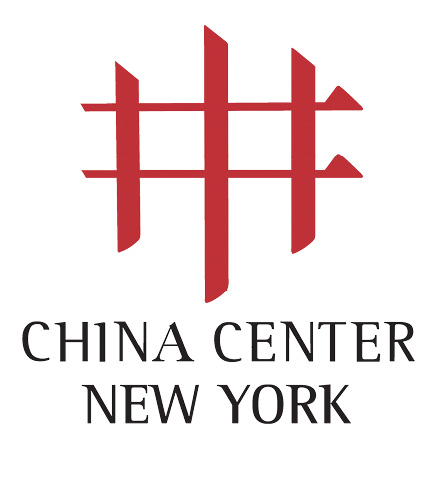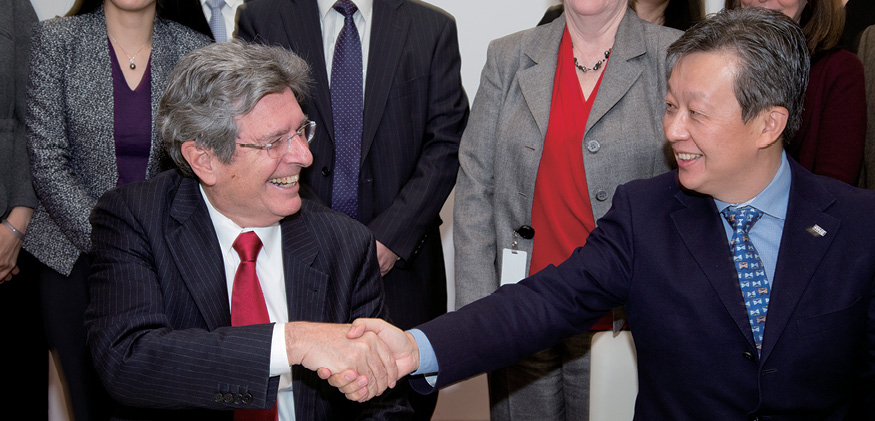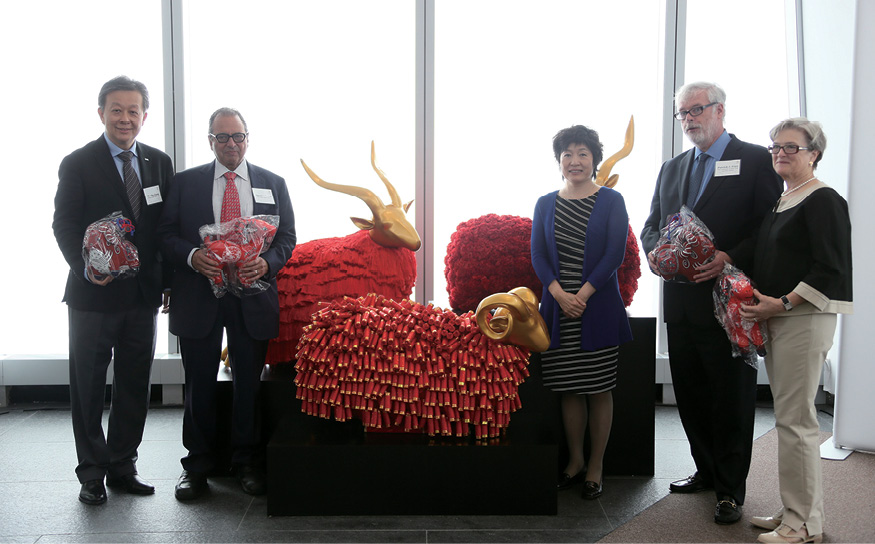- Home
- Media Kit
- Current Issue
- Past Issues
- Ad Specs-Submission
- Ad Print Settings
- Reprints (PDF)
- Photo Specifications (PDF)
- Contact Us

![]()
ONLINE

China Center New York - A Center of Sino-U.S. Synergy
Editors’ Note
Charlie Jiang is CEO of Vantone Holdings Co., Ltd, Chairman of Vantone Real Estate, and CEO of China Center New York. Jiang has served in the general office of CPPCC, he has held positions of General Manager – Greater China of Dornier MedTech, General Manager – Greater China of ATL Amercia, General Manager – Greater China of SingHealth Group, Chairman of Beijing Nongkecheng Investment Corporation, and President of Mega Healthcare Holdings Co., Ltd. He holds a bachelor degree in Law from the International Politics Department of Peking University.
Company Brief
China Center New York (chinacenter.com; CCNY) is the first organization of its kind where leaders from China and the U.S. gather under one roof to spur interactive discussion and growth opportunities. China Center New York is a modern sanctuary for business, social, and cultural exchange, and a home for China in a city of influence, and is a coveted venue for fine dining, corporate events, cultural activities, business, social opportunities, and global dialogue. China Center New York provides a portfolio of professional and personal offerings to meet client’s business and social needs.

What was the vision behind China Center New York?
Our dream with the center was to try to present the new China, especially coming into the 21st Century. This is driven by the desire to create something symbolic to represent China in this historical moment. Vantone has worked very hard over the past several years with the Partnership for New York City, the Port Authority, and the Durst Organization to achieve this goal.
Since I assumed the leadership role at CCNY two years ago, we have been focused on repositioning the project. The original plan was to provide offices for Chinese companies coming to New York. However, the companies now are coming to the market and buying whole buildings. CCNY needs to adapt to the demand of the new market, foster meaningful collaborations, and provide a deeper understanding of the U.S.
To better understand our audience, we recently completed an in-depth market survey. We selected 40 companies from the U.S. and 60 from China. They are all equally interested in the CCNY concept, although their demands and expectations are quite different. Our new program will be catered to meet those demands and create value for both sides.
With our move to the 89th floor, we now call this project a “sky platform” of Sino-U.S. synergy. CCNY is founded upon the power of synergy and we always talk about collaboration. Through our repositioning, the mutual understanding and respect will be enhanced to a new level.

Strategic Partnership with NYAS
How broad will your focus be and who will get value out of CCNY?
The survey shows both large and small companies are intrigued by the program and services that CCNY will offer. The U.S. companies are particularly interested in the business and political leaders we can bring from China. Many of the U.S. companies don’t have the necessary resources in China, but through CCNY, they can make those connections in New York.
Chinese companies, on the other hand, will use CCNY as a platform to look for business opportunities and partners in the U.S, as well as to seek services to establish themselves in New York.
What types of amenities will CCNY offer?
CCNY will be a high-end business club. We will have a full-service operations including fine dining, meeting facilities, office suites, and event space.
ClubCorp, a leader in the private U.S. club industry, will be working with us in this endeavor. They even want to invest in CCNY. This is a good example of “synergy.”

One World Trade Center
Is this designed then to be a convener, a facilitator, a networker, and a bridge to bring different groups together?
Yes. CCNY will be all of the above. To achieve these goals, we will set up a board of governors comprised of leaders from different industries to help steward these efforts.
In China, people talk about a slowdown. Should growth be perceived differently today and is the economy strong?
We need healthy growth. Growth should not be out of control – our environment cannot afford it. The Chinese government and Chinese companies will learn to find a healthy way to grow – this is our challenge and CCNY can contribute.
How would you describe the entrepreneurial spirit in China?
Everybody wants to start a new company in China. I encourage people to get an example of the real spirit of entrepreneurship from their peers in New York. I learn a lot from my entrepreneurial friends in the U.S. who have it in their blood.
Do you feel you can teach entrepreneurship or are you born with it?
I think it can be taught or coached, but for Chinese companies, they need to attain the spirit to take risks as well as the skill to minimize risks and make the start-up companies healthier.
My primary wish is that Chinese companies pursue newer technology and more creative ideas – it is not about finding something in the U.S. and making a copy in China.

Two Street Dialogue
What are the six pillars you have developed that support CCNY’s success?
Coming from the real estate industry, we naturally want to build a platform for real estate.
The second pillar is science and technology – we want to build a platform that facilitates dialogue among start-up companies here, the Silicon Valley, and the Beijing and Shanghai’s high-tech development zones. I also signed a strategic partnership agreement with the New York Academy of Sciences to have ongoing collaborations, especially in areas such as smart cities and green buildings.
The third pillar is the finance industry. We hosted the first “Two Street Dialogue” between Wall Street and Beijing Financial Street in 2014. Kathy Wylde of the Partnership for New York City led a delegation of Wall Street leaders and met with the governor from Beijing Xicheng District and the Chief from Beijing Financial Street. This year, I invited Port Authority’s Executive Director, Pat Foye, to speak at the Beijing Financial Forum in August.
The fourth pillar is the Sino-U.S. Friendship. National Committee of Sino-U.S. Relations is our partner with whom we discuss valuable friendship issues.
The fifth pillar is culture. Many Chinese are curious about the U.S. culture, healthcare, education, etc.
The sixth pillar is the club house – the five pillars above will be incorporated into the programs and services of the club. We will also offer various personal services in areas such as education, housing, and health management.

Three Sheep Bring Bliss
What advice do you give foreign companies and growth companies, those next-generation leaders interested in China? What should they think about as they look to enter the market?
At this moment in time, a “paradigm shift” is really important for U.S. companies that have been successful over the past 20 years, because China has come to a point of healthy growth. The Chinese government will try to drive and grow a sustainable economy, which requires paradigm shifts in many ways.
There will be a learning curve for U.S. companies and entrepreneurs to adopt a new mindset when dealing with the new China. The paradigm shift must come from both sides, so we can all sing the same tune.•